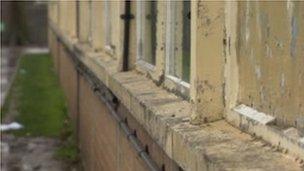Schools in priority building plan face funds black hole
- Published

More than half the schools in England's priority building scheme do not have guaranteed funding, it has emerged.
Since announcing the scheme last May, the government has struggled to find affordable long-term private finance for the majority of the 261 schools it planned to rebuild this way.
And at least half, 137, will have to wait until the next spending review to have their funding confirmed, it says.
This means battling it out with other departments to secure Treasury funding.
When Education Secretary Michael Gove announced that 261 schools would be built under the priority building programme, he said the majority, 212, would be built and funded by private finance initiatives.
'No guarantees'
The other 42 schools were to be funded directly by the Department for Education (DfE), though this was later increased to 51 schools.
But a year on, only one potential private finance package - covering seven schools in Hertfordshire, Reading and Luton - is ready for bidding to open by construction companies. They are to be invited to bid on the scheme at the end of this month.
The Department for Education said a further four regional batches, totalling 39 schools, will be finalised and released to bidders over the next 12 months. It is only after such deals are signed that start dates can be set.
And a further 27 are now to be funded directly by the DfE with a £300m sum from its capital budget.
But the rest of the programme, some 137 schools earmarked for the programme a year ago, it added, would now be "delivered using capital funding, subject to the next spending review settlement.
"The timetable for the remaining schools in the programme will be announced after the settlement is made in June."
This means the DfE will have to battle it out with other departments to secure the funding from the Treasury for the scheme. And there has already been speculation that many departments are facing harsher settlements than they may have expected.
Malcolm Trobe, deputy general secretary of the Association of School and College Leaders, said there was no guarantee these schemes would be funded, as extra borrowing would be required to bankroll them.
'Slow process'
"There is still an urgent need for a large number of schools that are in poor condition and urgently need significant refurbishment.
"It is good news for those in the first few batches, but very bad news for those further down the line. They have no start date and no guarantee of funding.
"It means they have got no guarantee that their work is going to be completed. It's a very, very slow process and it is going to seem extremely slow for those schools."
A DfE spokesman insisted that all the rebuilds would still go ahead and that the change of strategy was about finding value for money.
He confirmed that there had been "a few concerns about the affordability of the long-term debt and the fact that we wanted to get this work done quickly."
He added: "It's about making the right decision for the taxpayer."
The statement comes just two months after the BBC revealed that that programme was being held up by delays in finding private cash to fund it. At that stage, the delays were denied by Schools Minister David Laws.
Steve Beechey, head of education at the Wates construction company, welcomed the news about the schools that are progressing, but added: "It is a matter of concern that future school spending beyond these schools is not guaranteed.
"Many of the remaining 146 schools in the priority school building programme, who had thought they would be procured via PF2 [Private Finance 2], are in dire need of work, so it is very important that their funding streams are confirmed as soon as possible."
Cllr David Simmonds, Chairman of the LGA's Children and Young People Board, said:
"Government needs to reassure mums, dads and head teachers that these plans will be put into place quickly and provide definitive time scales on the future of their local schools."
He said that schools were being kept running by councils carrying out repairs, but many of them had been ready to be rebuilt and refurbished for several years.
According to Cllr Simmonds some of the schools were in such bad condition that it was impacting the quality of education.
Stephen Twigg, the shadow education secretary, said: "This government is failing to deliver on school rebuilding...
"This failure will mean pupils are stuck in overcrowded classrooms or under leaky roofs. Parents rightly expect more. Labour would kick start our flatlining economy by bringing forward investment in new school buildings."
- Published12 March 2013
- Published12 April 2013
- Published5 July 2010